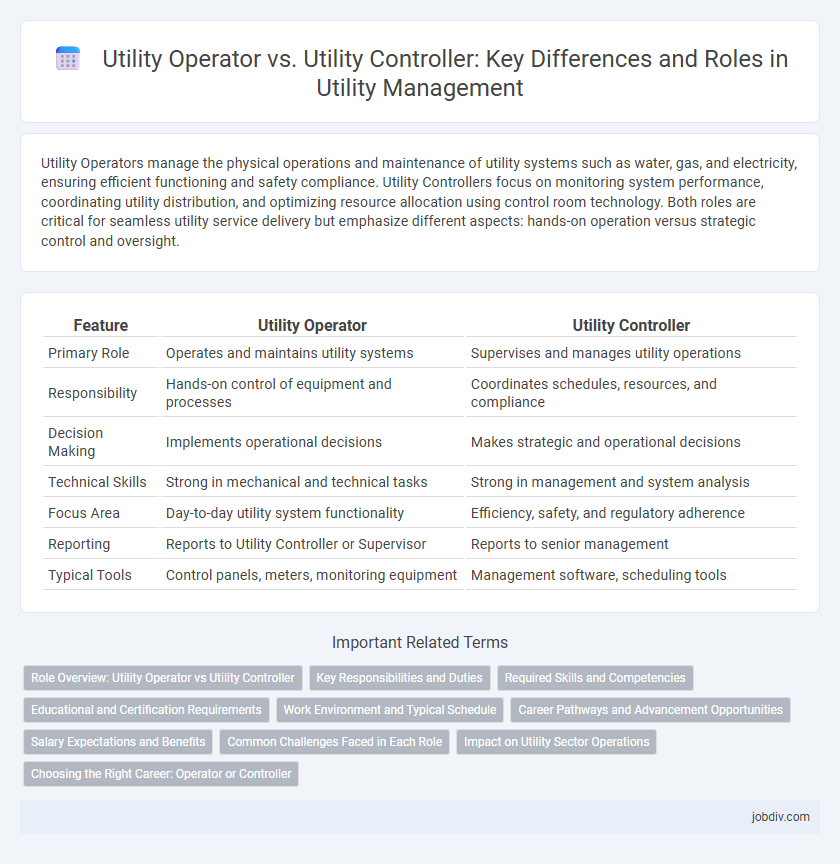Utility Operators manage the physical operations and maintenance of utility systems such as water, gas, and electricity, ensuring efficient functioning and safety compliance. Utility Controllers focus on monitoring system performance, coordinating utility distribution, and optimizing resource allocation using control room technology. Both roles are critical for seamless utility service delivery but emphasize different aspects: hands-on operation versus strategic control and oversight.
Table of Comparison
| Feature | Utility Operator | Utility Controller |
|---|---|---|
| Primary Role | Operates and maintains utility systems | Supervises and manages utility operations |
| Responsibility | Hands-on control of equipment and processes | Coordinates schedules, resources, and compliance |
| Decision Making | Implements operational decisions | Makes strategic and operational decisions |
| Technical Skills | Strong in mechanical and technical tasks | Strong in management and system analysis |
| Focus Area | Day-to-day utility system functionality | Efficiency, safety, and regulatory adherence |
| Reporting | Reports to Utility Controller or Supervisor | Reports to senior management |
| Typical Tools | Control panels, meters, monitoring equipment | Management software, scheduling tools |
Role Overview: Utility Operator vs Utility Controller
Utility Operators manage the day-to-day operation of utility systems including water, gas, and electricity, ensuring safe and efficient service delivery. Utility Controllers oversee system performance by monitoring usage data, coordinating load management, and responding to operational emergencies to maintain system stability. Both roles require technical expertise, but operators focus on field operations while controllers emphasize system analysis and real-time system control.
Key Responsibilities and Duties
Utility Operators manage the day-to-day operation of equipment and systems, ensuring efficient and safe performance by monitoring controls, conducting routine inspections, and performing minor maintenance. Utility Controllers oversee system operations at a higher level, coordinating workflows, scheduling maintenance, and managing resource allocation to optimize utility service delivery. Both roles prioritize safety compliance, operational efficiency, and timely troubleshooting to maintain continuous utility services.
Required Skills and Competencies
Utility Operators require strong technical skills in equipment operation, troubleshooting, and maintenance, with a focus on hands-on experience and adherence to safety protocols. Utility Controllers need advanced analytical skills, expertise in system monitoring, load forecasting, and real-time decision-making to ensure efficient grid management. Both roles demand a solid understanding of utility regulations, communication capabilities, and the ability to respond promptly to emergencies.
Educational and Certification Requirements
Utility operators typically require a high school diploma and specialized on-the-job training, while utility controllers often need a bachelor's degree in engineering, electrical technology, or a related field. Certification for utility operators may include state or industry-specific licenses, whereas utility controllers frequently pursue certifications like Certified Energy Manager (CEM) or Professional Engineering (PE) credentials. Both roles demand strong technical knowledge, but utility controllers generally have more advanced educational and certification requirements to manage complex grid operations and ensure compliance with regulatory standards.
Work Environment and Typical Schedule
Utility Operators often work in physically demanding environments such as power plants or water treatment facilities, managing daily operations and maintenance tasks with shifts frequently covering 24/7 schedules including nights and weekends. Utility Controllers typically operate in control rooms or offices, monitoring system performance and coordinating with field teams during standard business hours but may also be on call for emergencies outside regular shifts. Both roles require adaptability to shift work, but Operators face more exposure to industrial settings while Controllers focus on real-time data analysis within controlled environments.
Career Pathways and Advancement Opportunities
Utility Operators typically begin their careers managing daily equipment operations and monitoring system performance, providing a foundational understanding of utility infrastructure. Utility Controllers advance by overseeing control room operations, coordinating system stability, and managing emergencies, which requires enhanced technical expertise and decision-making skills. Career pathways often lead Utility Operators to progress into Utility Controller roles, with further advancement opportunities into supervisory or managerial positions within utility companies.
Salary Expectations and Benefits
Utility Operators typically earn an average salary ranging from $40,000 to $60,000 annually, with benefits including health insurance, retirement plans, and overtime pay. Utility Controllers command higher salaries, often between $70,000 and $90,000, reflecting their increased responsibility for managing operations and compliance, alongside enhanced benefits such as performance bonuses and comprehensive insurance packages. Salary expectations for these roles vary by location and experience but generally align with the level of operational oversight and decision-making authority involved.
Common Challenges Faced in Each Role
Utility Operators often face challenges related to real-time monitoring and managing equipment malfunctions, requiring quick decision-making to prevent service disruptions. Utility Controllers frequently encounter difficulties in load balancing and demand forecasting, as inaccurate predictions can lead to inefficiencies or blackouts. Both roles must address communication gaps and system integration issues to ensure seamless utility operations.
Impact on Utility Sector Operations
Utility operators manage day-to-day field activities ensuring the continuous delivery of services, directly impacting operational efficiency and system reliability in the utility sector. Utility controllers oversee real-time network control and load balancing, optimizing resource allocation to prevent outages and maintain grid stability. Coordination between operators and controllers enhances response times to incidents and supports effective asset management across electric, water, and gas utilities.
Choosing the Right Career: Operator or Controller
Utility Operators manage the physical operation and maintenance of electrical, water, or gas systems, ensuring continuous service and safety compliance. Utility Controllers monitor and control system performance through advanced software, analyzing data to optimize efficiency and troubleshoot issues remotely. Selecting between Operator and Controller roles depends on preference for hands-on technical work versus analytical and supervisory responsibilities within utility management.
Utility Operator vs Utility Controller Infographic

 jobdiv.com
jobdiv.com